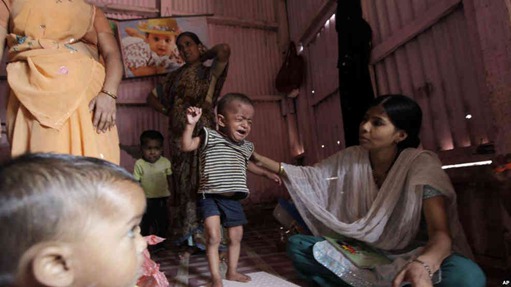爱最重要:关爱有助于儿童大脑成长
爱最重要:关爱有助于儿童大脑成长
导读:不要因为孩子小就不关心他们,小心会影响他们的大脑发育Over that period, the number of infant deaths has dropped sharply -- from about 12 million to six million worldwide.Infant child mortality has been cut thanks
导读:不要因为孩子小就不关心他们,小心会影响他们的大脑发育

Over that period, the number of infant deaths has dropped sharply -- from about 12 million to six million worldwide.Infant child mortality has been cut thanks to billions of dollars in aid and the work of many countries.
在这20年里,婴儿死亡人数大幅度减少了——在世界范围内,从1200万降到了600万。因为数十亿美元的救助和各国政府的努力,婴儿死亡率才能像这样减少。
However, a group of experts say that is not enough.For children to grow and develop fully, they need more than a nutritious diet and access to medicine.
但是,一些专家说这还不够。要想让儿童全面成长和发展,他们需要更有营养的食谱和更多就医的途径。
That is the opinion of a team of social scientists and public health experts.They found that about 200 million children are failing to meet their developmental potential each year.What is lacking, the experts say, is social interaction with the children and involvement by their caretakers.
这是一个社会科学家和公共卫生专家团队的观点。他们发现,每年都有2亿儿童没能开发出他们的发展潜力。专家们说,他们缺少的就是儿童的社会性互动和其监护人的参与。
The U.S. National Academy of Medicine set up the group of 32 academic experts.They provide strong evidence that just as a poor diet can harm children, violence and lack of care can damage a child’s brain.
美国国家医学学会建立了这个32人的专家学者队伍。他们提供了有力的证据,证明了暴力与缺爱、缺乏营养的食谱一样伤害孩子的大脑。
And that, they say, leads to physical and social stunting, even when aid programs are available.Stunting is when a person fails to grow and develop normally.
他们说,这导致身体和社交上的发展停滞,就算是援助项目到位了也会如此。“发展停滞”指的是一个人不能正常成长和发展的状态。
Neil Boothby is with the Mailman School of Public Health at Columbia University in New York.He likens social interaction to "investing in young children.”He adds that "it’s vital to ensuring international peace and security."
尼尔·布茨比在纽约哥伦比亚大学梅尔曼公共卫生学院工作。他把社会性互动比作“给幼儿投资”。他补充说,“这对于保证国际和平与安全是至关重要的”。
Boothby says that providing good, positive social interactions is as big a part of development as providing food and water.And these positive social interactions must be consistent and not, what he calls, episodic.
布茨比说,提供优良且积极的社会性互动是发展的重要一环,和提供水和食物同等重要。这些积极的社会性互动必须得是连贯的,用他的话说,不能断断续续的。
He calls the wiring in the brain, circuitry.And he calls the structure of the brain, ’brain architecture.’Here is Boothby.This becomes part of actually strengthening the circuitry in the brain.When the response isn’t there, or it’s episodically there, then (that) same circuitry, that same brain architecture is weakened.So it is not just micronutrient, it is also social care.
他把大脑中的线路叫作“回路”。他还把大脑的结构称为“大脑构架”。以下是布茨比的原话。“这是切实加强回路的重要一环。如果没有这样的响应,或者响应是断断续续的,那么相同的回路、相同的大脑构架就会减弱。所以不仅仅是微量营养素,社会关怀也要跟上。”
Boothby says studies have shown that international aid programs alone are not enough to help children reach their full ability.The Columbia University researcher just returned from Uganda.In that country, he says, more than a third of the population suffers from stunting.Signs of stunting include smaller physical growth and lower than average scores on intelligence tests.
布茨比说研究已经证明,国际援助计划本身并不足以帮助儿童全面发展。这位来自哥伦比亚大学的研究人员刚刚从乌干达回来。他说,在那个国家,超过三分之一的人口受困于发展停滞。发展停滞的标志包括较小的身体成长和智力测验低于平均分。
For example, I met with some parents on this last trip.Fathers were saying, ‘Ah, you know I don’t really engage with the child until she or he is three months old because they’re too little.’I mean that’s counter to what they should be doing because holding, talking, you know, caressing, etc., is all part of brain health.
“比如,我这趟去乌干达见到了一些父母。父亲们说,‘啊,孩子们三个月大之前我都不怎么管他们,因为太小了’。我是说,他们不应该这么做,因为你知道,抱孩子、交谈还有爱抚等等都是大脑健康的一部分。”
The paper, says Boothby, is a call for social interaction to be added to the list of health and nutrition assistance programs and concerns.You know, we teach parents when they go to clinics about water and sanitation.We teach them about the kinds of foods children should eat.Why aren’t we teaching them the things that make brains grow?
“你知道,我们在父母们去诊所的时候教他们关于水和卫生的知识。我们教他们关于孩子应该吃哪种食物的知识。为什么我们不能教他们关于大脑成长的知识呢?”
Boothby adds it is time for international aid policies to catch up with scientific research.Aid policies, he says, must combine the neurobiology of caring with other forms of assistance.
布茨比说,国际援助政策已经到了需要赶上科研成果脚步的时候了。他说,援助政策必须把育儿的神经生物学和其他形式的援助结合起来。